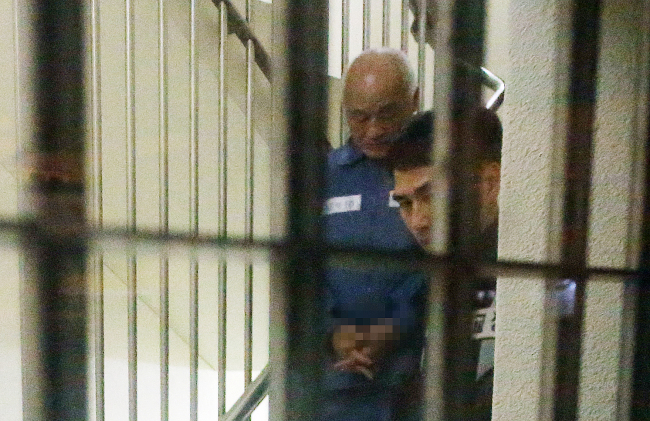South Korean tax authorities said on Thursday that they are tracing the hidden assets of Huh Jae-ho, a former Daeju Group chairman who is at the center of a snowballing controversy over a court’s ruling on the value of his prison labor.
The National Tax Agency said Huh’s assets are believed to be in Korea and New Zealand, where he lived affluently over the past four years.
“It’s been known that the tax agency is reviewing ways to levy unpaid tax against Huh,” an official familiar with the issue said.
The tax investigation came after the top prosecution office on Wednesday suspended Huh’s prison labor at the Gwangju Correctional Institute and decided to levy the remaining 22.4 billion won ($20.9 million) in fines after deducting six days of prison labor. “We have examined relevant laws to conclude that Huh’s prison labor should be suspended,” the Supreme Prosecutors’ Office said in a statement.
The prosecution’s decision was prompted by the mounting public criticism over Huh’s highly unusual daily pay and Huh’s extravagant lifestyle before imprisonment.
The court valued Huh’s daily labor at about 500 million won, almost a fivefold that of Samsung Group chairman Lee Kun-hee, the country’s richest man. A local court valued Lee’s daily labor at 110 million in 2008. The court’s generous valuation of Huh’s labor is also in sharp contrast to the usual pay of 50,000 won a day for other convicts.
 |
Former Daeju Group chairman Huh Jae-ho walks out from the Gwangju District Prosecutors’ Office on Wednesday after prosecutors withdrew the disgraced tycoon’s labor penalty. (Yonhap) |
The scandal over the disgraced businessman began in 2011, when the nation’s top court allowed him to work off his 25.4 billion won fine with 50 days of labor in prison for tax evasion and embezzlement.
Working prisons in Korea usually assign tasks such as folding paper bags or making tofu or furniture.
When he returned home after four years on the run on Saturday, it immediately caused a media firestorm, spawning the term “emperor’s labor.”
As for Huh’s alleged hidden assets, a special task force was sent to Auckland, New Zealand, in December last year to verify a construction company owned by Huh’s Daeju Group. The company went bankrupt and liquidated after Huh fled abroad in 2010.
Local reports also suggested that Huh owns at least 14 businesses related to construction, real estate and investment there, citing a local corporate registration agency.
Investigators have also found that the mogul has been receiving a monthly rent of about 10 million won from tenants of a building in Gwangju for years, through a borrowed-name account. The city government confiscated the account, which contained 57 million won.
A 65,115-square-meter tract of land Huh owns in Gwangju was also sold in a public auction by the Gwangju Regional Tax Office. The value of the land is estimated at about 30 billion won, according to news reports.
Some critics are lashing out at the presiding judge of the case, Jang Byung-woo, alleging that he had illicit ties and went easy on the former chairman.
The suspicions were further raised by the prosecution’s passive attitude when an appellate court halved Huh’s fine from 50.8 billion won to 25.4 billion won.
The prosecution did not take action against the decreased fine; instead, it complied with the lower court’s decision to double the value of Huh’s daily labor to 500 million won.
In response to the rising public outcry over the Huh case, the Supreme Court said it will review the prison labor system in which a presiding judge is currently given the authority to set the cost of labor.
Huh was indicted on charges of evading about 50 billion won in taxes and embezzling 10 billion won before the Daeju Group went bankrupt.
By Suk Gee-hyun (
monicasuk@heraldcorp.com)






![[Herald Interview] 'Trump will use tariffs as first line of defense for American manufacturing'](http://res.heraldm.com/phpwas/restmb_idxmake.php?idx=644&simg=/content/image/2024/11/26/20241126050017_0.jpg)
![[Exclusive] Hyundai Mobis eyes closer ties with BYD](http://res.heraldm.com/phpwas/restmb_idxmake.php?idx=644&simg=/content/image/2024/11/25/20241125050044_0.jpg)
